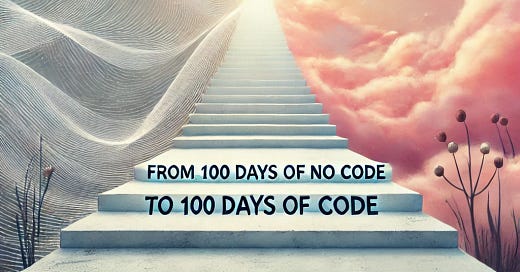From 100 Days of No Code to 100 Days of Code
Also just completed the Multi AI Agent Systems with CrewAI, and Loved it :)
Hey Guys,
It all started one year ago, with this letter and these words!
Print(“Hello World!”)
Yes, can you believe it, I will be celebrating one year of “Ease Into AI and No Code”, on the 16th Nov 2024.
“Thank you” to the 7562 human subscribers, that read my letter each Thursday.
I appreciate you all so much.
So, that said, welcome to another beautiful Thursday!
Just as Python programming shows us how a single space can make or break a line of code, causing errors, sometimes, in life, the smallest spaces we make for ourselves can have a huge impact.
So, let’s create a little space here, to take a delicious deep breath, pause what you’re doing, and come hang out with me 😀
I wanted to chat to you about something that’s probably got a few of you wondering why, as someone who loves the creative possibilities of No-Code and Low-code, I’ve chosen to come full circle and check out traditional coding.
100 days of Python Bootcamp-with Dr Angela Yu on Udemy
The honest truth, is that I bought this course about 3 years ago, and was waiting for the right time, which I believe to be now.
It's a herculean commitment, and yes, it’s intense.
The thing is, that its also already supporting me in my Hiring business where I create Boolean syntax search strings, as just like in programming, there is a mathematical order to this, which affects the final result, as well as whether this string will break OR Yield some results.
Generative AI Pushed Me to Revisit my Foundations
Generative AI is next-level amazing, especially with tools like CursorAI making it fun to chat with your code as it speaks human.
That was until I hit a block, like I did recently 🙄
Turns out, the block was me!
Or, more accurately, my lack of a deep software development background.
It all started when I was in Cursor, casually chatting with my code, throwing out random requests like, “Hey, can you switch this into Rust?”
Oops, and thats when the questions started piling up.
Suddenly, I was up against things like error messages that didn’t explain much, technical jargon that assumed I already knew the basics, and terms like "syntax error" or "runtime" that felt like another language.
At that moment, I couldn’t help but feel like Buddy in Elf, completely out of my depth, pressing every button just to see what would happen 🤣
It’s the excitement of discovering something new, mixed with that slight panic of not quite knowing what you’re doing yet!
I was missing gaps, that could then help me maximise how cool Cursor AI can be.
Anyhow another course, that made me realise I needed to get a more holistic dev overview, was CrewAI and their Multi AI Agent Systems ( its FREE and very cool, so defo do it)
Aristotle said it best when he said: “The whole is greater than the sum of its parts.”
Understanding each piece in isolation was not enough for me, I needed to see how they all work together.
So I enrolled myself into this software Development Bootcamp.
Python Coding and its relevance to Boolean Syntax Creation
Right from day one in my Python Bootcamp, I saw the synchronicities with what I do daily and that made me SMILE.
Learning about string concatenation, which is essential when building Boolean search strings, was like a lightbulb moment.
In Python, you combine two strings to make them work together, just like when I’m piecing together search strings.
It’s making my Boolean syntax even sharper and more effective.
See image above: Day 2 Learning about Data Types & classes
Deeper Understanding of all of this Tech
No-code and low-code tools are awesome for getting things up and running quickly.
But digging into how they actually work, the logic behind them, how they handle data, what makes their widgets tick, totally started to intrigue me :)
Development has so many moving parts, like checking network setups, running tests, writing and tweaking code, and making sure everything works smoothly together.
Getting a handle on all these aspects helps me build more solid and efficient solutions.
Plus, now that everyone can create stuff, we really need to put more focus on UX and the overall user experience.
Making sure our apps are not just functional but also easy and enjoyable to use is super important.
I believe this deeper understanding will give me an edge and earn more respect when working with these tools :)
Problem-Solving Skills
Development is about problems. And More problems. I am saying you must want to figure stuff out and help solve issues again and again.
As you learn how to debug, build correct syntax, and understand errors at a granular level.
This skill set translates directly into No-code, where even though things are “drag-and-drop,” the problem-solving mindset allows you to troubleshoot issues faster.
Discipline and Structure ( For me, thats what I need right now)
Code teaches discipline. I have committed to coding for 1 hour each day, for 100 days!!
Thats a BIG Commitment.
Where you will get slowly better as you practice and get to grips with correct syntax, a structure.
The practices I’m learning in Python, demand accuracy and add structure which I need right now.
This training forces me to think more clearly about project organization, which I believe will make me a better Visual Development aka No Code Builder.
Leaning into my Laptop
Is it just me, or does everyone else lean way into their screen when they’re trying to figure out code errors? 😂
I catch myself squinting, scrunching up my eyes, leaning closer, as if that’s going to reveal the magic fix. Ha!
Think I will eventually adapt.
The Story of the First “Debugging”
We talk about “debugging” in coding all the time, but did you know the term has a very literal origin?
On September 9, 1947, a team of computer scientists and engineers at Harvard University made history by discovering the world’s first recorded computer bug, an actual moth!
Their computer, the Mark II, was acting up, delivering strange errors. When the team opened it up, they found a moth stuck inside, disrupting the electronics.
One team member wrote in the logbook, “First actual case of bug being found,” and the rest is history.
Fun fact: while Dr. Grace Hopper was part of the team and often gets credit, she wasn’t the one who found the bug but likely helped make the story famous.
Going back to traditional coding isn’t about leaving No-code behind; it’s about helping me to reach heights of greatness, I would not otherwise have known.
I’m so excited to bring what I’m learning into my No-code work, to build better, understand deeper, and bring more value to every project.
Hope this resonates with some of you who might be considering the same path.
Wish I could stay to chat a bit longer, until next week.
Lets stay agile, creative, and radically curious.
Until next week,
Blessings Always
Nix Good
Cape Town









Wow, can't believe you've only being doing it one year, you seem like such a pro already